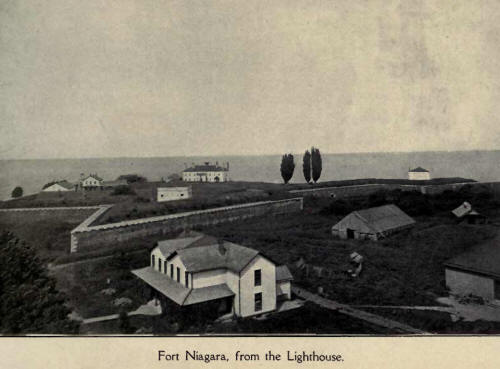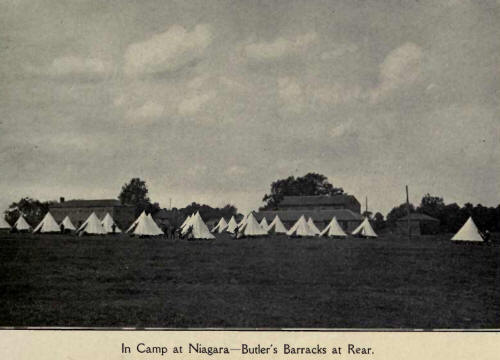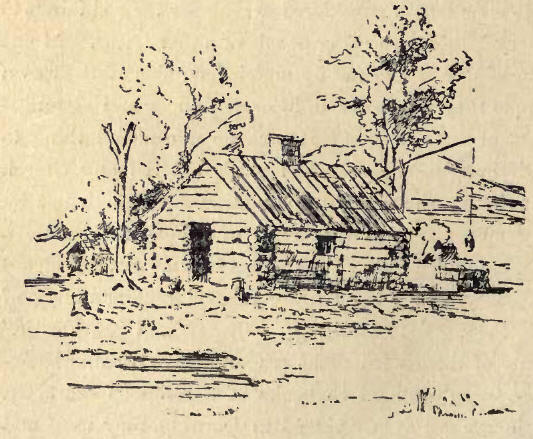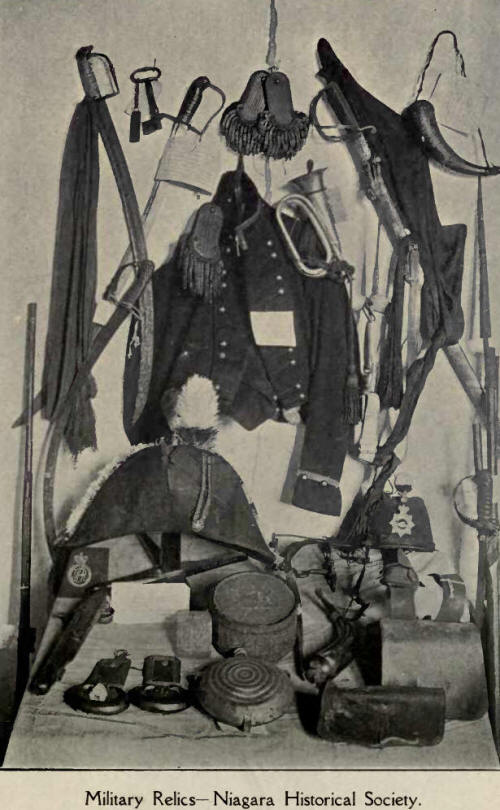WHO THE EARLY SETTLERS WERE—THE UNITED EMPIRE LOYALISTS—BUTLER'S
RANGERS—THE MENNONITES AND TUNKERN.
A
LARGE
proportion of the people who
settled on the frontier of Canada during the earlier days of settlement were
United Empire Loyalists, those
who came from the neighboring States of the American
Union at the
close of the Revolutionary War of 1776.
The first settlement of any
note was that made at Adolphustown, on the Bay of Quinte, in June,
1784. After
that date, settlements grew up on the St. Lawrence
Niagara and Detroit Rivers, and at Long Point, on Lake
Erie. The
impression is general that there were but a few
squatters previous to
that time. Provincial Government
affairs, however, being at that period
in an unorganized
condition, such records as are at hand have only the
reliability of tradition. A number of the first settlers were persons who
had naturally sought refuge in the vicinity of Fort Niagara and other
border forts, then in the possession of England, from the relentless
persecution that was waged against British sympathizers intending to
return home when peace was concluded, as they fully expected it would be,
in favor of Britain; but, finding the result to be contrary to their
expectations, they crossed the border and took up land on the Canadian
side. Colonel Butler and his Rangers were granted a large tract of land in
the vicinity of what is now the town of Niagara.
The first settlers were a mixed stock of English, Irish, Scotch and
German, many of whose ancestors had settled in the United States, then
British territory, a century or more previous, some of them probably
coming to America on the Mayflower, in 1620. This class of settlers, who
came mostly from New York, New Jersey and Pennsylvania, brought with them
the customs, habits and style of living of their American forefathers.
Being of a Conservative type, they preferred a monarchical to a republican
form of government. After these settlers came a large number of Yankees,
attracted by the fertile lands of Canada; and, although they were not
British in sentiment, many of them afterwards became loyal subjects of the
country, and fought for Britain in the War of 1312. There were whole
settlements of "Pennsylvania Dutch" (properly called German), adherents of
the Mennonite and Tunker faiths, whose descendants to this day make up a
large part of the population of Welland, Lincoln, Waterloo and York
Counties. There were also large settlements of Quakers, particularly in
the vicinity of Font Hill, near St. Catharines, and along the Bay of
Quinte, who, like the Mennonites, left the States, fearing the Government
might insist on their bearing arms. The feeling against British
sympathizers being so strong, there was some talk of compelling all,
irrespective of their religious belief, to take part in military affairs.
Many of the Mennonites and Quakers, having been granted the religious
freedom they desired under British rule, were not in sympathy with the
Revolutionary party. This brought down the wrath of the new Government
upon them, and, although they threatened to enact measures that would
curtail the freedom of these sects, they never carried their threats into
execution. There were also a few settlers from the British Isles and from
Germany, but the larger number of this class came later on. Many of the
British soldiers who had taken part in the Revolutionary War and the War
of 1812, having been given free grants of land by the Government, after
receiving their discharge, settled in the country.
The United Empire Loyalists.

If honor is a mark of nobility, then the old United
Empire Loyalists can truly be classed among the first aristocracy of
Canada, for a more honorable class of people
never settled in the Province. Steadfast in character, true to their
principles, loyal to their king, they chose to leave their homes and
property in the United States and come and hew out new homes for
themselves in the Canadian backwoods rather than remain under a government
so antagonistic and bitter towards the Mother Country they loved. Many of
them had considerable property, but they preferred to sacrifice it all
rather than become citizens of a hostile government. To be sure the
British Government gave them grants of land, and furnished many things
necessary for begin- fling life in a new country so far away from the
older settled parts; still it did not begin to repay them for the
hardships and privations they endured in the early days of their
settlement. Many of them sundered family ties that they might remain true
to their convictions and allegiance. As an instance, the writer has in
mind one family where the mother remained in Pennsylvania with several of
her children, while the father came to Canada with the remaining two, and
although the mother followed the waggon conveying her husband and children
away, weeping, and trying to prevail on them to remain,
it was of no avail. Possibly he had good reasons for leaving the country;
for the Whigs had burned his house, and all there was in it, because he
sympathized with the Royalist party.
A sequel to the above took place
several summers ago, when a party of the descendants of the Pennsylvania
branch of the family visited their Canadian cousins, exchanging fraternal
greetings, renewing acquaintance, and endeavoring to perpetuate the love
and friendship existing between the two branches of the family which,
though differing in nationality, are yet one in blood.
Mr. Kirby, in his "Annals of
Niagara," says that "every one of the U. E. Loyalists had a military
bearing, an air of dignity, and a kindly spirit of comradeship, derived
from dangers and hardships which they had shared together." The wealth and
aristocracy of the Colonies, as a rule, were arrayed on the side of the
Royalist party, while many of the rebels were persons having no great
interest at stake. The defeat of their party meant no great loss to them,
while on the other side it meant the loss of all, especially if they had
been active partisans, or were not willing to swear allegiance to the new
government. Can we wonder at the staunch conservative principles of their
children and grandchildren who were our parents? To this adherence to the
principles of monarchical government, as an American author has said, "was
due the sterling character and dignity of these people." They believed in
a principle and they fought for it. The old U. E. Loyalists never got over
their bitterness towards the United States. This antagonism was inherited
by their descendants for several generations. It was more of a national
than an individual hatred, however. The women were equally as patriotic
and loyal as the men, and you could not offend one of them more than by
saying anything against their country. It is told of one of the women in
the early days that she would not eat at the same table with a Yankee. Her
reason for being so bitter was that her husband had been shot in cold
blood by the rebels during the Revolutionary War. Many of these women
displayed their patriotism and loyalty during the war of 1812 by looking
after the crops while their husbands were away fighting for their country.
The firmness and dignity of the
old U. E. Loyalists and their descendants were due to a great extent, no
doubt, to their military training, for in the fore part of the nineteenth
century all men between a certain age were enrolled in the militia.
Butler's Rangers.
Many of the United Empire
Loyalists were military men who had taken part in the Revolutionary War. A
large number of those who settled in the vicinity of Niagara and in other
parts of the Niagara Peninsula had formerly belonged to Butler's Rangers,
a regiment of cavalry who carried on a guerilla warfare against the
revolutionary party of the United States, their operations being confined
principally to the eastern parts of the States of New York and
Pennsylvania. They were accused of laying waste the country, destroying
property, and burning buildings. Many atrocities were laid to their
charge, however, which were quite unsupported by the facts, and where
offences were committed the actual facts were greatly exaggerated. It is
true that war at any time is cruel and relentless, and many things are
done that at another period would be considered barbarous. Most of the
Indian tribes of New York State sided with Great Britain and made frequent
raids on the American settlements. It is possible that the onus of their
evil work may have been placed upon Butler's Rangers. In their raids the
Rangers were associated with Indian allies. It is quite probable that many
of the atrocities attributed to the Rangers were perpetrated by the
Indians connected with them, and whose well-known ferocity when on the
war-path the Rangers themselves were unable to restrain.
The Indians, it is true, may have
been assisted by some few cruel white men, fiends in human form, who
unfortunately got a footing amongst Butler's Rangers; but the general
opinion has been long since arrived at that most of these stories were
gotten up by the Americans in order to excite the American people to
revenge. General Sullivan, who was sent by the United States Government to
make raids on the Loyalist settlements of New York State, is reported to
have been guilty of just as much cruelty as the Rangers were ever charged
with. A Ranger descendant told the writer that his father always said the
stories of the cruelty of Butler's Rangers were at first manufactured and
afterwards adopted as American history yet we well know that in American
history there has been a great deal of falsification of the actual facts
when relating to anything pertaining to Canada, and They even now admit
some of the mistakes themselves. When war is being waged there is a great
tendency to exaggerate and falsify, anyway. Take, for instance, the
reports sent out by the Beers during the late Boer-British War in South
Africa. It is not denied that some of those who had belonged to Butler's
Rangers were a rough class—there are always such who follow the fortunes
of war—and were known to boast of the cruelties they had committed; but
how do we know that they were always telling the truth? They may have told
these stories to excite the awe and terror of the children of the people
among whom they lived. We all know the proneness of such characters to
exaggeration. The poet Campbell has given a pathetic description of the
descent of the Rangers into the Valley of Wyoming, in his poem entitled
"Gertrude of Wyoming." It was proved to him afterwards, however, that the
facts upon which he based his poem were quite baseless and without
foundation. Just how much truth there was in the stories of the alleged
cruelties of these Rangers may never be fully known; but the fact remains,
and can be fully vouched for by some of the old people still living, that
horrid stories concerning them, such as the killing of innocent women and
children, the burning of their homes, dangling infant children on their
bayonets over the fire, and other equally revolting fireside anecdotes of
admitted doubtful veracity, were common talk among the old settlers, both
Loyalist and otherwise, in every section of the country, and talked and
told over and over again, just for talk's sake.

The common saying that none of the
Rangers were known to die a natural death was but one amongst the many
other exaggerations as we know from ocular proof to the contrary. As has
just been said, it is admitted that some of the Rangers were of a low type
of men. But one black sheep or two should not be accepted as true
representatives of a hardy, courageous and enterprising. type of guerilla
soldiers. Here is an instance that will explain our meaning: One of the
old Rangers, who lived alone on the Niagara, was the dread of the women
and children in the neighborhood on account of the frightful stories he
told. When he died, it is said, the coffin would not stay in the ground,
but one end kept coming to the surface. The superstitious people in the
neighborhood attributed this fact to his wickedness, whereas the real
cause was quicksand! Some few of the Loyalists, on account of the hardship
and ill-treatment they were subjected to by the rebel party, were filled
with the spirit of resentment. And who can scarcely wonder at this? It was
the result of despair.
In one instance, known to the
writer, the American soldiers came to the house, and demanded the young
men of the family; when told they were away they shot the old father of
the family, without any provocation, on his own threshold. And other cases
of this kind, equally barbarous and unjustifiable, might be given. One
thing must ever remain to the credit of the Rangers —their adherence to
principle.
"Their loyalty was still the same
Whether they lost or won the game."
When talking over facts of history
that occurred during war time a century and a quarter ago, we must
remember that military discipline and martial law were very severe then,
much more so than at the present day. At that time, even during peace,
persons were hung for forgery and sheep stealing. Alen had no heart or
"bowels of compassion"; victory must he gained at all hazards, and no
matter at what sacrifice. It is said that the military men who settled at
Niagara were of a stern character, and had no conscience when it came to
carrying out military discipline and stratagem.. This was the class of men
Col. Murray took with him for the attack on Fort Niagara, on the night of
December 19th, 1813. The orders were that not a soul should live between
the landing-place and the fort. This was to prevent anyone from notifying
the garrison of the fort of the approach of the enemy. The attack on Fort
Niagara was said to have been in retaliation for the burning of Niagara by
the Americans. The inhabitants were only given half an hour's notice by
the American general, and that on a bitter told December day. It can
safely be said of the descendants of most of these old soldiers of the
Revolution, however, that they have proved an honorable and honest class
of men in every relation of life.
The Mennonites and Tunkers.
The Mennonites were among the
earliest settlers in Upper Canada. Many of them settled in Welland and
Lincoln counties previous to 1800, and in that year their settlement in
Waterloo County began, Waterloo Township being bought by a company of
these people. Markham, Vaughan, and Whitchurch townships, in York County,
were settled largely by members of this sect. Through marriage and social
intercourse with English-speaking people their language and peculiar
customs are fast disappearing, and it looks as if in the course of a very
few years there would be nothing left but their family name and their
religion, which some of them still adhere to, to distinguish them from
other people.
The early Mennonite settlers must
not be classed, however, with the Russian Mennonites who settled in
Manitoba more than a quarter of a century ago, although originally of the
same stock. Although being like the Quakers, a non-fighting class of
people, we think the early settlers of this class might properly be called
United Empire Loyalists. Their sympathies in the Revolutionary War were
certainly with Great Britain, although, in consonance with their religious
belief, they refused to bear arms for either party. They were honest,
God-fearing, industrious people, many of whom left Pennsylvania and came
to Canada for the reason that the British Government granted them
exemption from military service, and allowed them to make an affirmation
instead of taking an oath or making an affidavit in the courts, which
privilege they were not sure of being able to retain under the government
of the United States.
Their religion was opposed to war
and going to law. In this respect they resembled the Quakers. Their
ancestors emigrated from Switzerland and the Palatinate along the Rhine
early in the eighteenth century, and settled in the commonwealths of
Pennsylvania and Maryland. Many of their descendants are to be found yet
in those states, some of them still retaining the language, religion,
style of dress, habits and customs of their German ancestors, although for
the last fifty years there has been a gradual breaking away from the
primitive customs which their forefathers brought with them from the
fatherland and maintained so well for more than a hundred years.
It is no longer considered wrong
for their children to marry English-speaking people of other faiths. At
one time if one of the family married outside of their own people they
were sure to incur the anger and estrangement of their parents. It was no
uncommon thing to find young people who had never entered any church but
that of their own denomination. Although not by any means an ignorant
class of people, they were a simple-minded folk; all the education that
was considered necessary among them being a good understanding of the
three Rs: "Reading, 'Riting, and 'Rithmetic." Many of them were great
readers; their reading, however, being confined to books of a religious
character. Although not deeply versed in learning, they were and are a
thinking class of people. As is quite apparent from the thrifty manner in
which they conduct their business, which was and is chiefly in the
agricultural line.
The Tunkers (or Brethren) belonged to the same race
of people and spoke the same language as the Mennonites, most of them in
the early days being converts from the faith of the latter. Their customs
and habits of living were similar. Their style of dress, however, was
somewhat different. In religion they differed chiefly in the form of
worship and tenets of their faith.


|

